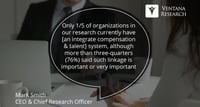Partners play a key role in the revenue and growth of every organization. Whether channel selling is in assistance to internal sales or independent, what happens in partnering has ramifications that are simply too important to underestimate. The imperative to maintain business continuity with channel partners becomes painfully clear in a global pandemic, and that imperative demands that organizations cultivate partner excellence and channel performance. This effort should start with partner...
Read More
Topics:
Big Data,
Customer Experience,
Learning,
Office of Finance,
Voice of the Customer,
Business Continuity,
Analytics,
Digital Technology,
Work and Resource Management,
Operations & Supply Chain,
Sales Enablement and Execution,
Conversational Computing,
work experience management,
partner management,
AI & Machine Learning
Compensation and the processes and systems to support it are at the center of success in every organization, as I have noted recently.In our view, an investment in total compensation management software is a strategic step toward advancing human capital management. Our benchmark research on this topic found some progress in attitudes about modernizing compensation practices. Almost three-fourths (72%) of organizations said that it is important or very important to have a total compensation...
Read More
Topics:
Human Capital Management,
Office of Finance,
Learning Management,
HRMS,
Workforce Management,
Work and Resource Management,
ERP and Continuous Accounting,
Payroll Optimization
Compensation management is essential for any organization that values engaging and retaining its employees. It is a fundamental component of a range of personnel-related activities – recruiting and hiring, assessing performance, and career and succession planning. Determining and providing appropriate compensation, which may involve base pay, merit pay, variable pay and incentives or bonuses, is equally important for all members of the workforce – full- or part-time employees, contingent or...
Read More
Topics:
Human Capital Management,
Office of Finance,
Learning Management,
HRMS,
Workforce Management,
Work and Resource Management,
ERP and Continuous Accounting,
Payroll Optimization
Workforce management is a key topic of expertise for Ventana Research. We define workforce management as the set of activities and processes organizations use to manage their hourly and salaried workforce for maximum productivity. It involves not only scheduling, tracking and paying for time worked but also aligning that work to the tasks and objectives of the organization. Workforce management is a critical component of every company’s operations, human resources and overall human capital...
Read More
Topics:
Human Capital Management,
Office of Finance,
Learning Management,
HRMS,
Workforce Management,
Work and Resource Management,
ERP and Continuous Accounting,
Payroll Optimization
Human capital management (HCM) offers a prime opportunity for organizations and their human resource professionals to make employee-related processes effective in engaging and retaining the workforce. Manual administrative processes often hampered HR in focusing on the workplace experience and employee satisfaction. Modern HCM applications can help them manage members of the workforce as critical assets and make continuous investment in people-related processes, deriving insights on issue such...
Read More
Topics:
Human Capital Management,
Office of Finance,
Learning Management,
HRMS,
Workforce Management,
Work and Resource Management,
ERP and Continuous Accounting,
Payroll Optimization















